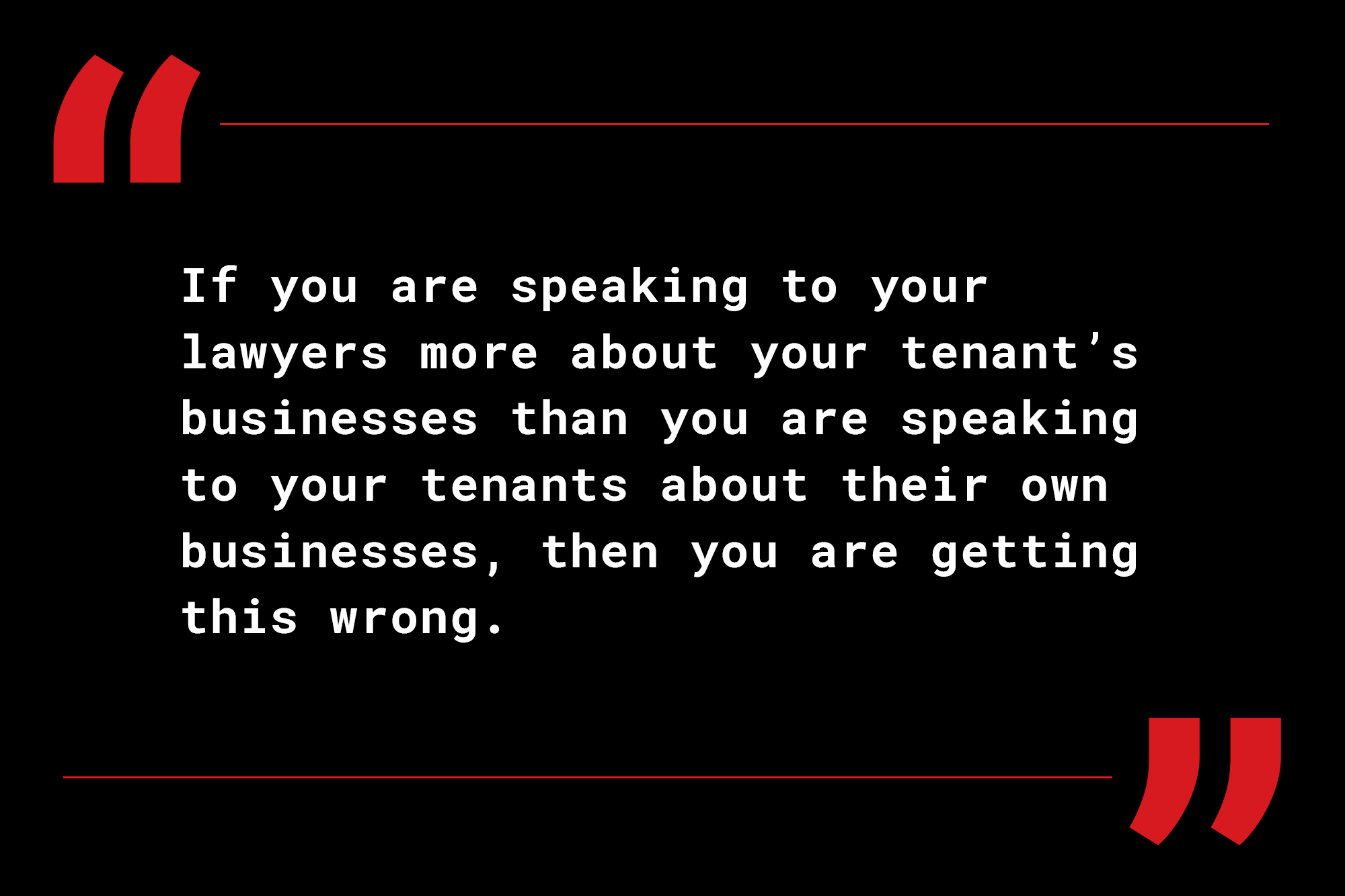Update #6: Scale of Pain
Dear Clients & Colleagues,
I’ll just say it: May 1 is going to be more sobering than April 1 was. And April 1 was rough. Rough for tenants; and rough for landlords.
I make this statement for a bunch of reasons, largely based on data, landlord feedback, and the tenant realities we have been tracking and processing these past 6+ weeks. But I also make this statement for one key non-empirical reason, which is that I think a lot of us really thought we’d be on a clear path to recovery by May 1, and the emotional blow that comes along with the fact that we just aren’t is very hard to digest.
Retail and restaurants will be in a worse place on 5/1 than they were on 4/1. In fact, there is widespread recognition for those of us in the business of retail real estate that our recovery will be measured in quarters and years instead of weeks and months. This is the part that is most sobering. And scary.
But there is reason for hope, and this hope comes in the form of more information and more knowledge. Because right now any new insight and data that can help us adapt and respond to the uncertainty I wrote about last week is reason to celebrate. This is our mind-set right now: get smarter, move faster, work harder, keep hustling. In sum: survive.
And our survival (and success) as a company right now depends on good and reliable intel. So for this 6th edition of my weekly update here’s some of the market intel, recommendations, and related issues we are thinking a lot about over here at Graffito:
- April Rent Collection Data
- PPP Realities (yeah, more on this…)
- Retail Closings (Chapter 11 Bankruptcies vs. Outright Closings/Ch 7)
- A Note on Lawyers
April Rent Collection Data
Recent data from a real estate intelligence company that was shared confidentially with Graffito reports that total rent collections on 4/10 were down 45% from 3/10 among an expansive set of national tenants tracked and are down 46% percent among “non nationals” tracked. These numbers may seem high to some of you (i.e. a 45% drop is less than expected, right?), which is largely because: (i) there are in fact certain retailers still paying rent, including pharmacies, grocery stores, banks, discount retailers (dollar store, big lots, family dollar, etc.), convenience stores, pet stores, home improvement outposts, and take-out / drive-through focused fast service restaurants (Taco Bell, Domino’s, KFC, etc.); and (ii) these “essential businesses” make up a significantly larger percentage of the retail market in non-urban areas, which the above data is heavily weighted towards (and, similarly, remember that as of 4/1 certain parts of the US included in this data set were still not yet on lock-down…). Comparable rent collection data we’ve seen for urban markets for the same period is considerably worse than the 45% leakage reported in this national study.
Related Companies CEO Jeff Blau recently shared in an interview with CNBC that Related collected only 35% of contracted retail rents for 4/1 across its portfolio in non-mall assets and just 20% in malls assets. We are hearing from many other landlords with urban portfolios that collection percentages for 4/1 rent were less than 20%. Related’s rent collection percentage will almost certainly get worse for May 1. And it is unlikely that landlords, anywhere, will experience better collection rates on 5/1 than 4/1.
Some may dispute this dire prediction for 5/1, suggesting that there will be a rent bump from the Paycheck Protection Program (PPP) of the CARES Act. But for those of you that have been reading our blog of late, we don’t buy it.
More on PPP
As we’ve documented extensively on our blog (and as has been reported widely in the media this past week) the PPP of the CARES Act has largely failed retail and restaurant establishments. It is possible some PPP recipients will use funds towards 5/1 and 6/1 rent, but it is also likely that any payment of rent now comes with a request for rent relief for later this summer. So maybe there is a little blip on the radar this month, but taken in total it doesn’t help retailers pay rent as we move into what will remain difficult and non-profitable months through the Summer.
Further, as more data is being released on the distribution of PPP funds by the SBA and its lenders, the injustices in our political and economic systems are on full display. Banking relationships matter. Contractual literacy matters. Access to established (and expensive) professional resources matter. Those companies that have these things got PPP funds. Those companies that do not (such as many of the retailers and restaurants we all deal with in the urban context, particularly minority owned businesses) did not. There are cultural, racial and political reasons for this, and we are hopeful that the systematic injustices revealed by the PPP rollout will help fuel future change.
Another immediate takeaway from the PPP shortcomings of the past few weeks is that it reinforces the value of our local banking institutions. It’s the local banks that most successfully pivoted quickly in the first few days of the program to get applications into the SBA (and approved) and get funds out to businesses. Many of the large national banks really struggled (and continue to struggle) with PPP.
I’ve spoke to many small business owners of late that will be moving all of their banking to smaller local banks coming out of this crisis. And as it relates to us all in the business of retail leasing, we may just see a more aggressive expansion of local and regional banks in the years ahead than would have been the case if we were still in world without COVID-19.
Retail Closings
There will be and has been a lot in the news of late on looming retail bankruptcies. JC Penny and Nordstrom could file as early as this week and more will follow. But bankruptcies and related restructurings under Chapter 11 are different than closings and Chapter 7 liquidations. It’s the closings that are most damaging; and they too are coming…
A Harvard Business School article from the School’s Working Knowledge initiative recently concluded: “If the COVID-19 crisis lasts four months, 65 percent of small retailers say there’s a good chance they’ll be forced to close permanently by the end of the year. Among restaurants and bars, 70 percent expect to go out of business if social-distancing orders last into July.” Link here.
Last week I heard confidentially about two very well established and renowned restaurants in the Boston area that will certainly not reopen. Keith McNally announced publicly (to a lot of fanfare) that Lucky Strike, one of his first NYC restaurants, will not reopen. We are all going to be surprised by some of the places that will never open their doors again. Or maybe we won’t. But regardless we need to brace for the reality that no retailer is untouched by this crisis. Even those essential businesses that are currently thriving will be hit soon by snags in supply chain logistics and rising operational costs.
The takeaway here remains this: you must start a dialogue with every one of your retail tenants. Know where they are at. What are their pressure points? What is their path to recovery? Are they considering a permanent closure?
This last question — are you considering a permanent closure? – is an absolutely crucial one. Permanent closures and related liquidations can be really ugly for retail landlords. So I ask you this: if your tenant isn’t paying you rent now, isn’t going to recover, and has term on their lease, why not consider what a lease termination looks like sooner rather than later?
There is no one size fits all here though, and investor / lender obligations vary widely. But now is the time to start to consider the relative strength of your retail portfolio. Some of your tenants won’t return, some will. Having a bit of insight into who falls into what bucket is damn important. And speaking of retail closures…
Lawyers, Again
I bet you’ve all been speaking to your lawyers a lot of late, right?
This is good, lawyers are needed now – big time, but recognize that most lawyers don’t know all that much about your retail tenant’s businesses. So here’s my first takeaway regarding your dealings with lawyers:
If you are speaking to your lawyers more about your tenant’s businesses than you are speaking to your tenants about their own businesses, then you are getting this wrong.
Over the past few weeks I’ve seen some landlord counselors at their absolutely best (highly creative, compassionate, forward-looking) and some at their absolute worst (overly aggressive, dismissive of human dynamics, uninterested in considering the uncertainty ahead). On the tenant side the same is true, the best lawyers are counseling tenants through all the grey area that exists in their leases and looking at landlord dealings as a collaborative pursuit with an eye towards both today and the future. The worst are encouraging their clients to skirt any talk with landlords and instead aggressively assert (on said attorney’s letterhead, of course) one or two decently concocted reasons why they will not be paying any rent for the foreseeable future.
So here’s my second takeaway regarding lawyers: if he or she is being overly aggressive and/or suggesting to you there is in fact one right approach for your entire portfolio, then hit pause immediately. She or he might be right, but take some time to consider other more nuanced and customized solutions for your properties and your tenants.
________
Here at Graffito we are trying to take our own advice really seriously, spending a lot of time talking internally and externally about the evolving needs of retailers while also not presupposing that all landowners have the same levers to pull in granting tenant relief and getting creative with remedies. Further, on our first large-scale repositioning project with our friends at Northpond, we as a partnership are taking this unique and bizarre moment in time to better position our real estate for what 2022 looks like versus what 2019 looked like. And as we evaluate additional projects together into the future, we are doubling-down on our shared belief that succeeding in the retail world is not about short-term hits, but about a steadfast commitment to long-term value creation.
It is this long-term perspective that is keeping us sane over here at Graffito right now, and also giving us the proper mind-set to absorb some of the intense short-term pain that has come with this crisis. It is also what is driving our pursuit to keep the blog relevant and these weekly emails from me as honest and forward-looking as possible. So we’ll be keeping at it in the weeks and months ahead and I love hearing form you all in response to these emails.
More next week in update #7. And happy Patriots’ Day to all of you in the fine state of Massachusetts,
/Jesse




